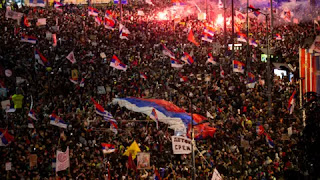These ongoing protests began back in November 2024, when a station roof in Novi Sad, Serbia’s second city, collapsed, killing 16. The response to this tragedy was to question the transparency of investment in Serbia’s infrastructure, since it was not clear exactly who was to blame. Students have now been organising protests in Serbia for several months, with perhaps as many as 325,000 gathering in Belgrade on 15 March, the largest anti-government protest in Serbia for decades. Universities across the country have been shut down now for five months.
 |
| Crowds gather in Belgrade on 15 March 2025 |
Hence the students’ journey to Strasbourg, the second seat of the European Union. They want to ensure that Serbia is not permitted to become a member of the EU until it sorts its corruption out. “The country needs to deliver on EU reforms, in particular to take decisive steps towards media freedom, the fight against corruption and the electoral reform,” European Commission President Ursula von der Leyen wrote on X on 25 March.
Prime Minister Miloš Vučević resigned in January, possibly a sacrificial lamb for the ruling party, and on 6 April Vučić appointed Đuro Macut, a little-known medical professor, as Prime Minister. Critics fear that the politically-inexperienced Macut will be little more than a puppet for Vučić. Thus far, the appointment of a new government has made no perceptible difference.
Vučić appears defiant in the face of the protests, declaring at one point that, “You will have to kill me if you want to replace me.” He is cracking down on protests – allegedly using a sound canon to break up the protest in March – and on press freedoms. The NGO Reporters Without Borders (RSF) has said that the pressure exerted on independent outlets from ministers and state-backed media has reached levels not seen since the 1990s. If it seems like you haven’t heard much about what is going on in Serbia, this may be why.
A counter rally in support of the government, its ranks swelled by Serb nationalists from neighbouring Kosovo and Bosnia, took place on 13 April and was attended by 55,000 people, which, though smaller than the anti-government protest, is no inconsiderable number. Vučić addressed the crowd in typically bullish manner, claiming the student protesters had "inflicted huge evil on Serbia in the past five months." He also stated that, "Certain foreign powers cannot bear to see a free, independent and sovereign Serbia”, without clarifying which "powers" he was referring to.
For their part, the students themselves are keen to keep nationalism out of their protests and focus only on domestic corruption. When nationalist symbols, including the controversial map of Kosovo with ‘No Surrender’ plastered across it (a reference to the Serb nationalist claim that Kosovo will always remain part of Serbia), student leaders were quick to stress that geopolitics had no part to play in their protests.
Serbia is clearly a troubled nation. Its status as a pariah state in Europe has driven it towards Russia and away from the EU. Despite being vilified for its part in the Yugoslav wars, Serbia has never apologised for its role. Many Serbs remain angry at the west and NATO for its bombing during the Kosovo War, with bombed out buildings left untouched as reminders of what was done to the country. If there is hope of banishing the ghosts of the past, it may lie with the younger generation, as has been the case throughout history when it comes to movements affecting radical change.
The protests remain ongoing. This week, the protesters have called for a snap election, and though Vučić has vehemently opposed the idea, there are small signs that the tide may be turning. Even Trump seems to think Vučić is toxic – it is rumoured that he denied the Serbian president a meeting on his visit to the USA last week. And if POTUS thinks you’re doing something wrong, you really must be.
On 25 April, a group of students from Belgrade began a relay ultramarathon to Brussels that will cover almost 2000km. They plan to arrive in Brussels on 12 May, when the European Parliament should be in session, in order to deliver letters about the political situation in Serbia. One of the students taking part said the hope is that the letters will be read in Brussels so that “more attention will be given to the deep political and social crisis in Serbia.” One can only hope that these young people will succeed in bringing the world’s notice to their country and help to bring about the end of the era of the rabid nationalist politician in the Balkans.
References and Further Reading
https://www.rferl.org/a/serbia-cyclists-students-strasbourg-Vučić-canopy/33386850.html
https://www.rferl.org/a/serbia-Vučić-railway-canopy-protest-belgrade-students/33349372.html
https://www.bbc.co.uk/news/articles/cly18qd7x7do
https://www.bbc.co.uk/news/articles/c0qdyg8yn5yo
https://www.reuters.com/world/europe/thousands-gather-pro-government-rally-serbia-2025-04-12/
https://prishtinainsight.com/serbias-student-protests-and-kosovo-between-hope-and-concerns-mag/
https://uk.news.yahoo.com/serbias-protesting-students-demand-snap-090746622.html

No comments:
Post a Comment